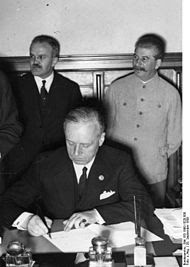Wednesday 23 August 1939
 |
| Molotov, Ribbentrop, and Stalin in Moscow on 23 August 1939 (Federal Archive). |
The pact provides in pertinent part that:
Basically, the two parties had decided that what Poland's government wanted was irrelevant, and they would decide the country's fate. There also were secret protocols, not disclosed for many years, dividing up the Baltic states between the two powers.The question of whether the interests of both parties make the maintenance of an independent Polish state desireable and how the frontiers of the state should be drawn can be definitely determined only in the course of further political developments. In any case, both governments will resolve this question by means of friendly understanding.
Unbeknownst to the Germans, the pact had been in doubt until shortly before Ribbentrop's visit. The last straw for Stalin to throw in with Hitler was the Polish government's refusal to allow British and French troops on their territory in mid-August. It was this event that decided the timing of the pact and gave Ribbentrop the green light to fly to Moscow.
It is Ribbentrop's shining moment. He will never be in such favor as he is when he returns to Berlin. Hitler, however, gives a speech taking personal credit for the agreement. When Ribbentrop's repeated assurances that the British and French will not intervene to protect Poland are shown to be false only days later, he will quickly fall from grace.
 |
| Molotov and Ribbentrop in Moscow on 23 August 1939. |
Pre-War
8-9 November 1923: Beer Hall PutschDecember 20, 1924: Hitler Leaves Prison
September 18, 1931: Geli Raubal Commits Suicide
November 8, 1932: Roosevelt is Elected
30 January 1933: Hitler Takes Office
February 27, 1933: Reichstag Fire
March 23, 1933: The Enabling Act
June 20, 1934: Hitler Plans the Night of the Long Knives
June 30, 1934: Night of the Long Knives
August 1, 1936: Opening of the Berlin Olympics
September 30, 1938: The Munich Agreement
November 9, 1938: Kristallnacht
August 1, 1939: Flight Tests of B-17 Flying Fortress
August 2, 1939: Einstein and the Atom Bomb
August 7, 1939: Goering Tries to Broker Peace
August 14, 1939: Hitler Decides To Attack Poland
August 15, 1939: U-Boats Put To Sea
August 16, 1939: Incident at Danzig
August 20, 1939: Battle of Khalkhin Gol
August 22, 1939: Hitler Tips His Hand
August 23, 1939: Ribbentrop-Molotov Pact
August 25, 1939: Hitler Postpones Invasion of Poland
August 27, 1939: First Jet Flight
August 31, 1939: The Gleiwitz Operation


